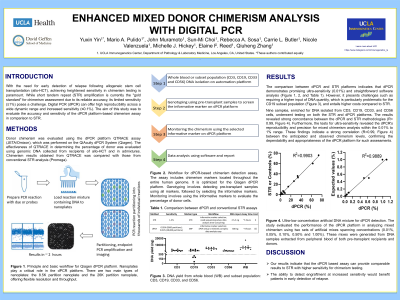ENHANCED MIXED DONOR CHIMERISM ANALYSIS WITH DIGITAL PCR
(P801) Enhanced mixed donor chimerism analysis with digital PCR
Location: Platinum Ballroom

Poster Presenter(s)
Aim: With the need for early detection of relapse following allogeneic stem cell transplantation (allo-HCT), achieving heightened sensitivity in chimerism testing is paramount. While short tandem repeat (STR) amplification is currently the "gold standard" for chimerism assessment due to its reliable accuracy, its limited sensitivity (≥1%) poses a challenge. Digital PCR (dPCR) can offer high reproducibility across a wide dynamic range and increased sensitivity (≤0.1%). The aim of this study was to evaluate the accuracy and sensitivity of the dPCR platform-based chimerism assay in comparison to STR.
Method: Donor chimerism was evaluated using the dPCR platform QTRACE assay (JETA/Omixon), which was performed on the QIAcuity dPCR System (Qiagen). The effectiveness of QTRACE in determining the percentage of donor was evaluated using genomic DNA collected from recipients of allo-HCT and in admixtures. Chimerism results obtained from QTRACE was compared with those from conventional STR analysis (Promega).
Results: The comparison between dPCR and STR platforms indicates that dPCR demonstrates promising ultra-sensitivity (0.01%) and straightforward software analysis (Figure 1A). However, it presents challenges such as requiring a higher input of DNA quantity, which is particularly problematic for the CD19 subset population (Figure 1B), and entails higher costs compared to STR. Nine samples, enriched for DNA isolated from CD3, CD19, CD33, and CD56 cells, underwent testing on both the STR and dPCR platforms. The results revealed strong concordance between the dPCR and STR methodologies (R2= 0.99, Figure 1C). Furthermore, the tests for ultra-sensitivity revealed the dPCR's reproducibility and precision for mixed chimerism analysis within the 0.01% to 1% range. These findings indicate a strong correlation (R2=0.99, Figure 1D) between the anticipated and observed chimerism levels, confirming the dependability and appropriateness of the dPCR platform for such assessments.
Conclusion: Our results indicate that the dPCR based assay can provide comparable results to STR with higher sensitivity for chimerism testing. The ability to detect engraftment at increased sensitivity would benefit patients in early detection of relapse.
Method: Donor chimerism was evaluated using the dPCR platform QTRACE assay (JETA/Omixon), which was performed on the QIAcuity dPCR System (Qiagen). The effectiveness of QTRACE in determining the percentage of donor was evaluated using genomic DNA collected from recipients of allo-HCT and in admixtures. Chimerism results obtained from QTRACE was compared with those from conventional STR analysis (Promega).
Results: The comparison between dPCR and STR platforms indicates that dPCR demonstrates promising ultra-sensitivity (0.01%) and straightforward software analysis (Figure 1A). However, it presents challenges such as requiring a higher input of DNA quantity, which is particularly problematic for the CD19 subset population (Figure 1B), and entails higher costs compared to STR. Nine samples, enriched for DNA isolated from CD3, CD19, CD33, and CD56 cells, underwent testing on both the STR and dPCR platforms. The results revealed strong concordance between the dPCR and STR methodologies (R2= 0.99, Figure 1C). Furthermore, the tests for ultra-sensitivity revealed the dPCR's reproducibility and precision for mixed chimerism analysis within the 0.01% to 1% range. These findings indicate a strong correlation (R2=0.99, Figure 1D) between the anticipated and observed chimerism levels, confirming the dependability and appropriateness of the dPCR platform for such assessments.
Conclusion: Our results indicate that the dPCR based assay can provide comparable results to STR with higher sensitivity for chimerism testing. The ability to detect engraftment at increased sensitivity would benefit patients in early detection of relapse.

